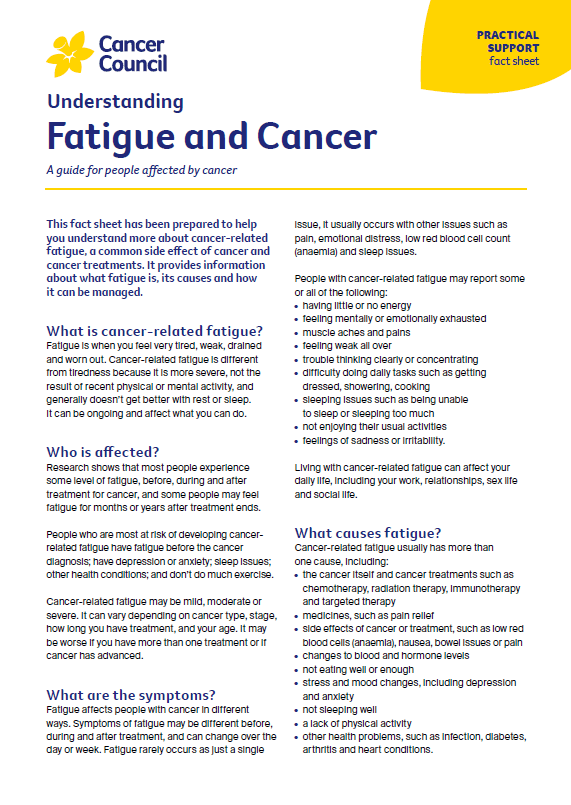Fatigue
It is common to feel very tired and lack energy during and after treatment. This can be a side effect of the treatment itself or a symptom of menopause.
Learn more about:
Overview
Travelling to hospitals and clinics for treatment and appointments can be exhausting. Dealing with your emotions can also cause fatigue. Your tiredness may continue for a while after treatment has finished.
Fatigue may affect your ability to keep working or care for your home and family. It may help to talk with your family and friends about how you feel, and discuss ways they can help you.
Tips for managing fatigue
- Do some light exercise, such as walking or stretching, to help increase your energy levels. Check with your doctor if these activities are suitable for you. You can also ask for a referral to an exercise physiologist or physiotherapist.
- Plan your day. Set small, manageable goals so you can rest regularly, and allow yourself plenty of time to get to appointments.
- Ask for and accept offers of help from family and friends (e.g. with shopping, housework, meals and riving). Contact your local council to see what support services they offer.
- Learn to recognise signs of tiredness before you feel exhausted.
- Talk to your employer about taking time off work, reducing hours or working from home.
- Don’t expect to be able to instantly do everything you used to do. Your body is still recovering and it will take time for your energy levels to return.
Learn more about Fatigue and Cancer and Living well after cancer
Podcast: Managing Cancer Fatigue
Listen to more of our podcast for people affected by cancer
More resources
All updated content has been clinically reviewed by Professor Alison Brand, Clinical Professor, The University of Sydney and Director, Department of Gynaecological Oncology, Westmead Hospital, NSW. This edition is based on the previous edition, which was reviewed by the following panel: A/Prof Orla McNally, Consultant Gynaecological Oncologist, Director Oncology/Dysplasia, Royal Women’s Hospital, Honorary Clinical Associate Professor, University of Melbourne, and Director of Gynaecology Tumour Stream, Victorian Comprehensive Cancer Centre, VIC; A/Prof Yoland Antill, Medical Oncologist, Peninsula Health, Parkville Familial Cancer Centre, Cabrini Health and Monash University, VIC; Grace Guerzoni, Consumer; Zeina Hayes, 13 11 20 Consultant, Cancer Council Victoria; Bronwyn Jennings, Gynaecology Oncology Clinical Nurse Consultant, Mater Hospital Brisbane, QLD; A/Prof Christopher Milross, Director of Mission and Radiation Oncologist, Chris O’Brien Lifehouse, NSW; Mariad O’Gorman, Clinical Psychologist, Liverpool Cancer Therapy Centre and Bankstown Cancer Centre, NSW.
View the Cancer Council NSW editorial policy.
View all publications or call 13 11 20 for free printed copies.

